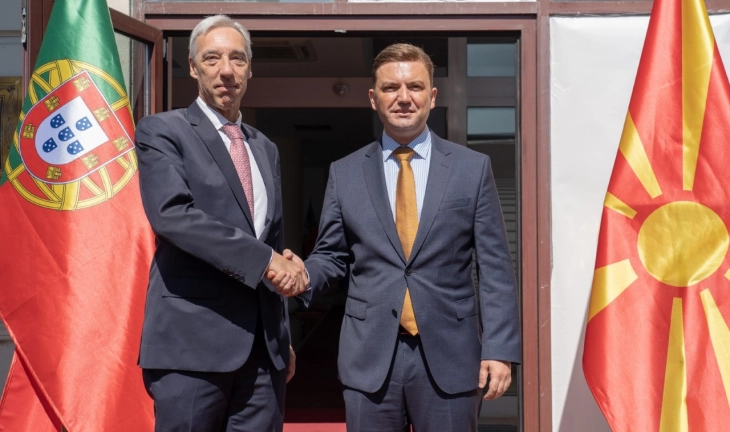Gomes Cravinho says he doesn’t expect bilateral blockades from Bulgaria during negotiations, considers issue settled
- Post By Nevenka Nikolik
- 12:41, 26 July, 2022

Skopje, July 26, 2022 (MIA) - Portuguese Foreign Minister João Gomes Cravinho told Tuesday’s joint press conference with his Macedonian counterpart Bujar Osmani that the country can count on Portugal’s continued political, technical and other support throughout the entire EU accession process.
“We believe that North Macedonia’s accession is essential not only for North Macedonia and the region, but also for the EU. We are convinced of this and will support you in any way,” said Gomes Cravinho.
Gomes Cravinho said he didn’t expect during the country’s negotiations with the EU another bilateral blockade from Bulgaria, which he considers to be a settled issue.
In response to a reporter’s question on what were the improvements to the Portuguese proposal, he said that the goal in politics was not to achieve everything, but achieve what is possible.
“We’ve invested a lot of effort during our presidency to put together a proposal that we wanted to be accepted. What makes the French proposal better? In politics the goal is not to achieve everything, but what is possible. If you look beyond the horizon, and not focus only on current developments. That’s why I give credit to the Macedonian leadership for overcoming the difficulties and moving the process forward. A very important step forward has been made. We believe that the agreement that has been reached is an agreement that allows start of the screening process which is quite intensive and technically has two phases. The first is explanatory screening, the EC explains the different phases, i.e. aspects of the legislation, and this is followed by the bilateral screening, when gaps in North Macedonia’s legislative framework are determined,” Gomes Cravinho said.
According to him, the screening process is starting, and then a second intergovernmental conference will be held as soon as the screening is completed and as soon as constitutional amendments are finalized.
He noted that all countries have difficult times during the negotiations, but, he added, even in the case of North Macedonia, he sees no reason why there will be bilateral blockades.
“I think it is of essential importance in international relations, in international policy, to trust the given word on the signed commitment. The bilateral issue that North Macedonia and Bulgaria are discussing more intensively has been settled. There is a conclusion, the settling of that issue was marked with the intergovernmental conference held on July 19. I don’t expect this issue to be raised again. I don’t see a reason why it would be raised again. If blockades start regardless of what has been agreed upon, the entire functioning will be paralyzed,” Gomes Cravinho pointed out.
He congratulated the Macedonian Government on what he said was a historic event that took place on July 19.
In addition, Gomes Cravinho stressed that in the coming months Portugal and North Macedonia should focus on developing bilateral relations, adding that they are excellent in a political sense, but communication between citizens, economic cooperation, as well as cooperation in education should also be strengthened.
Osmani thanked for the continued Portuguese support on the country’s European path, highlighting that North Macedonia remains committed to the reform tasks it is to fulfil during the negotiations and building good neighborly relations as investment in the country’s European future.
“The visit comes at an extremely important time for the EU enlargement process. We agreed that the opening of the accession negotiations will bring multiple benefits - for North Macedonia, for the region, but also for the EU’s credibility towards completing the European unification process,” Osmani pointed out.
Osmani also agreed that despite excellent political relations, the country has unfortunately not yet signed bilateral agreements with Portugal, and trade exchange, he added, is below the excellent level of political relations.
The two foreign ministers also discussed mutual support in multilateral organizations, and exchanged views on current international issues, with an emphasis on the situation in Ukraine.







